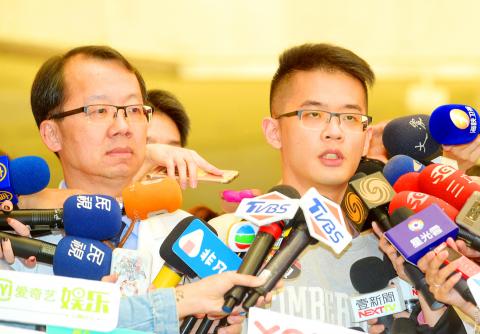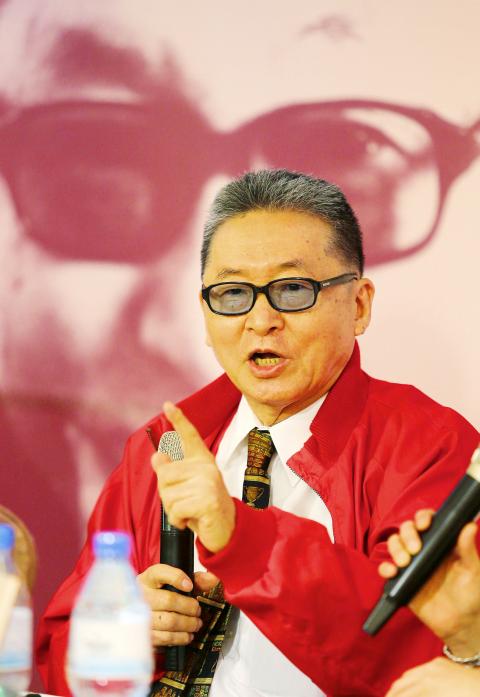Author, politician and historian Li Ao (李敖) yesterday passed away peacefully after a battle with brain cancer, Taipei Veterans General Hospital said.
Li was 83 years old.
He had sought treatment at the hospital in July 2015, saying he had an unsteady gait, and was later diagnosed with brainstem gliomas.

Photo: Chang Chia-ming, Taipei Times
His condition had stabilized after initial treatment, but he was readmitted to hospital several times last year.
In October last year, he was hospitalized for pneumonia, but a subsequent magnetic resonance imaging brain scan showed that his tumors had worsened.
Li began receiving targeted therapy in November and his condition improved.

Photo: CNA
However, the therapy started to lose effect in January and his overall condition began to deteriorate, the hospital said.
His son, Li Kan (李戡), yesterday said his father had remained strong and resilient during his illness, adding that he discussed his disease with medical personnel jokingly.
Li Ao’s family would make his funeral as simple as possible and does not plan to hold any public remembrance activities, Li Kan said.
As a versatile writer with a piercing and critical style, Li Ao was best known for his studies on history, in addition to his political commentaries, biographies and literary works.
During the Chinese Nationalist Party’s (KMT) authoritarian regime, he was regarded as an intellectual heretic who fought for freedom of speech and publication.
His 96 works were banned by the KMT during the Martial Law period.
“Li Ao epitomizes a wish, an action, a symbol of rebellion for people in that era,” said Chen Fang-ming (陳芳明), a professor at National Chengchi University’s Graduate Institute of Taiwanese Literature.
“The era’s intellectuals were eager to watch his performance, but none dared to join his company,” Chen said. “He was more critical and radical than any self-esteemed leftists.”
“Without Li Ao, Taiwan under [the KMT’s] authoritarian regime might have had a harder time,” he added.
Li Ao worked for a while in real estate, served as editor-in-chief of Wen Hsing (文星) magazine, founded a publishing house named after himself, was a TV host and taught history at Soochow University.
He ran for president in the 2000 election on the New Party ticket, and was elected as a lawmaker in 2004.
Li Ao is a legend among his contemporaries, former legislative speaker Wang Jin-pyng (王金平) said yesterday, adding that he had “lost a good friend.”
Democratic Progressive Party caucus whip Ker Chien-ming (柯建銘) said he admired Li Ao’s polished, critical and solid writing, and that he inspired rebellious movements against the government.
People First Party caucus whip Lee Hung-chun (李鴻鈞) expressed his sorrow over Li Ao’s death.
The Executive Yuan offered its condolences to Li Ao’s family.
Executive Yuan spokesman Hsu Kuo-yung (徐國勇) said he and Premier William Lai (賴清德) served at the Legislative Yuan with Li Ao in 2004, and expressed sadness over his death.

CHAOS: Iranians took to the streets playing celebratory music after reports of Khamenei’s death on Saturday, while mourners also gathered in Tehran yesterday Iranian Supreme Leader Ayatollah Ali Khamenei was killed in a major attack on Iran launched by Israel and the US, throwing the future of the Islamic republic into doubt and raising the risk of regional instability. Iranian state television and the state-run IRNA news agency announced the 86-year-old’s death early yesterday. US President Donald Trump said it gave Iranians their “greatest chance” to “take back” their country. The announcements came after a joint US and Israeli aerial bombardment that targeted Iranian military and governmental sites. Trump said the “heavy and pinpoint bombing” would continue through the week or as long

TRUST: The KMT said it respected the US’ timing and considerations, and hoped it would continue to honor its commitments to helping Taiwan bolster its defenses and deterrence US President Donald Trump is delaying a multibillion-dollar arms sale to Taiwan to ensure his visit to Beijing is successful, a New York Times report said. The weapons sales package has stalled in the US Department of State, the report said, citing US officials it did not identify. The White House has told agencies not to push forward ahead of Trump’s meeting with Chinese President Xi Jinping (習近平), it said. The two last month held a phone call to discuss trade and geopolitical flashpoints ahead of the summit. Xi raised the Taiwan issue and urged the US to handle arms sales to

State-run CPC Corp, Taiwan (CPC, 台灣中油) yesterday said that it had confirmed on Saturday night with its liquefied natural gas (LNG) and crude oil suppliers that shipments are proceeding as scheduled and that domestic supplies remain unaffected. The CPC yesterday announced the gasoline and diesel prices will rise by NT$0.2 and NT$0.4 per liter, respectively, starting Monday, citing Middle East tensions and blizzards in the eastern United States. CPC also iterated it has been reducing the proportion of crude oil imports from the Middle East and diversifying its supply sources in the past few years in response to geopolitical risks, expanding

Pro-democracy media tycoon Jimmy Lai’s (黎智英) fraud conviction and prison sentence were yesterday overturned by a Hong Kong court, in a surprise legal decision that comes soon after Lai was jailed for 20 years on a separate national security charge. Judges Jeremy Poon (潘兆初), Anthea Pang (彭寶琴) and Derek Pang (彭偉昌) said in the judgement that they allowed the appeal from Lai, and another defendant in the case, to proceed, as a lower court judge had “erred.” “The Court of Appeal gave them leave to appeal against their conviction, allowed their appeals, quashed the convictions and set aside the sentences,” the judges